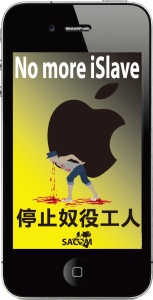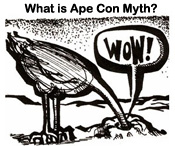
Each year on the near-south side of Milwaukee a few hundred folks gather together to commemorate the Bay View Tragedy, the bloodiest day — May 5 1886 — in the history of the labor movement in Wisconsin. I won’t bother rehashing the clash right now (you’re welcome to read about it here). Instead, I would like to reconsider it in the context of our contemporary world, from Fox News and Foxconn to Scott Walker and Steve Jobs.
Much attention has surrounded the working conditions for employees making Apple products in China, particularly at the Foxconn factory in Shenzhen, a city of 17 million people, which mainly manufactures the iPad and iPhone, as well as 40 percent of the entire world’s electronic devices. (Think about that for a moment: nearly one of every two electronic gadgets is manufactured by Foxconn! Around the world. Foxconn employs 1.2 million people in China alone.) What had more or less begun as a series by two reporters at The New York Times, Charles Duhigg and David Barboza, in the fall of 2011 has admirably spiraled out to the attention and critique of a diverse body of individuals and organizations across the country and planet, with the preliminary effect of Apple’s otherwise immaculate reputation now like a crack spidering out on a windshield of a car quite possibly out of control.
The series by Duhigg and Barboza about the human costs of Apple products, called “The iEconomy,” is good, solid journalism. I encourage you to peek and peruse here. There is much to read and think about, ranging from Apple’s tax dodging, to working/ living conditions at the plant, to outsourcing and 21st Century manufacturing. Whether you own Apple products or not, love them or loathe or couldn’t care a curse about them one way or another — is irrelevant. Apple is the richest company on planet Earth, the richest company quite probably in the history of all humankind. Thus, this affects us all, like it or not.
I won’t bother delving into what you can learn about for yourselves or know already. What I would like to endeavor here is considering the reality of Chinese manufacturing from the template of our own past, particularly with May Day, the International Workers Day, in mind. (Needless to say that contemporary manufacturing practices are not endemic to China alone, but many southeast Asian nations, as well as Africa, Central and South America.) What this boils down to is quite simply “been there, done that.” Apparently, in addition to the basic manufacturing itself, we have outsourced our exploitative labor practices, too. If we refuse to learn from our past — to avoid making the same mistakes in the present or future — then what the hell is the point of history anyway?
In some essential ways, China is what America was. Those soft propaganda blandishments of “Achieve through Hard Work” or “Aim for the Greater Good” exhorting the workers is one of those clear-cut examples where capitalism and communism show themselves to be two sides of the same coin. That China is arguably the most bastardized version of communism the world has ever known is hardly surprising, since its page book has been taken from the west. But whereas we, for the most part, have moved above and beyond our earlier industrialized past, China is the living incarnation of those David Copperfield days. That we have changed is by no means a reflection of a more enlightened society whose former magnates, barons, and factory bosses — the capitalists, in short — sympathized with the peril of the working men, women, and yes, let’s not forget, children who scraped away a pittance of a living. “Power concedes nothing without a demand,” Frederick Douglas famously wrote. The history of the labor movement, of worker’s rights, was long, loud, and awfully bloody. (See this article by Chris Hedges for a richer history.) The demand — which is still ongoing today, especially today, here in Wisconsin in particular — the demand is everything. It is not the “demand” of Adam Smith’s law of supply and demand. But in China, ironically, it might as well be.

To take the Foxconn factories alone as examples (though they are not solitary players by any means), you will work a minimum of ten hours a day and spend twelve hours a day inside the factory. Standing up the whole time, or on backless stools. Often though the shifts are much longer; it is not uncommon for workers to be coerced into shifts of sixteen to 24 hours a day (called “continuous shifts”), when there is a large order — when consumers demand a new product. You will sleep on a cot in a crammed dorm room with about ten other workers, though sometimes as many as 20, sometimes even 30. (This is quite a different kind of cramming done in dorms than American kids with their Macs and iPods are familiar with.) Including overtime pay, you are likely to earn about $17 a day.
In addition to terrifically stressful conditions — paranoia over non-compliance of monthly/daily/hourly quotas, the pressure to be more productive — you will be handling toxic materials that make Apple products’ screens shinier and more resilient, some of which will poison you for life. You will be exposed to a variety of toxins regularly if not constantly. Toxins like n-hexane, a chemical that causes nerve damage and paralysis — but is used to clean iPhone screens because it dissolves three times faster than mere rubbing alcohol. Three times faster means three times the amount of phones. It’s not for me to judge, but a crippled hand seems like an awfully high price for a fucking telephone.

Factories have blown up on account of their unsafe conditions, killing as many as four workers, injuring 77 others. Let me be specific about “unsafe conditions”: concentrates of highly combustible aluminum dust, created by nothing more than polishing iPad cases so that be shiny and have that cool chrome Apple product chic, self-ignited in two separate factories in the span of seven months. As Duhigg reports in one of the articles in the series, all that is needed to fix the issue of dust accumulation is basic ventilation, period. Said a former chairman of the National Advisory Committee on Occupational Safety and Health, Nicholas Ashford, “It’s gross negligence, after an explosion occurs, not to realize that every factory should be inspected.” Outraged by this, he continued, “[D]o you know how easy dust is to control? It’s called ventilation. We solved this problem over a century ago.” But why learn from history and the misfortune of the former exploited? As Nicholas Ashford pointed out, “[W]hat’s morally repugnant in one country is accepted business practices in another, and companies take advantage of that.” So much for universal human rights.
Workers have committed suicide by jumping off the roofs or from their windows. Not just one or two isolated incidents either; there have been enough to have warranted the resurrection of huge nets and fences preventing jumpers or catching them before they crash. The British newspaper The Mail has reported that workers at one plant must sign a contract promising, in effect, not to commit suicide. I realize they are protecting their bottom line, and that is business as usual, but are you really starting off on the right foot with a company when you first have to pledge not killing yourself because of your job?
To Apple’s credit (though I’m unsure that’s the right word), the company conducts more internal audits and inspections than any other electronics company. Most of the folks who were at Apple aren’t all that different than those of us who buy their products: good people who are positively appalled by what we’ve all been reading and hearing lately about conditions overseas. Independent journalism notwithstanding, the majority of information and statistics pertaining to Apple factories comes from Apple itself. Here’s a quick primer, from an interview with Charles Duhigg by This American Life host, Ira Glass:
“In 2007 Apple conducted audits at 39 facilities,” Duhigg states. “Of those, they found that 66 percent of the
facilities that were inspected, more than 50 percent of the workers were working more than 60 hours a week.” Duhigg continues, “More than 50 percent of facilities are violating limits on how many days per week people should work or how many hours per week people should work.” Some of whom, he points out, are underage workers, 15-year-olds with falsified records.
In the Times piece about the human price mentioned above, Duhigg along with his partner David Barboza have this to say:
“Over the next three years, Apple conducted 312 audits, and every year, about half or more showed evidence of large numbers of employees laboring more than six days a week as well as working extended overtime. Some workers received less than minimum wage or had pay withheld as punishment. Apple found 70 core violations over that period, including cases of involuntary labor, under-age workers, record falsifications, improper disposal of hazardous waste and over a hundred workers injured by toxic chemical exposures.
“Last year, the company conducted 229 audits. There were slight improvements in some categories and the detected rate of core violations declined. However, within 93 facilities, at least half of workers exceeded the 60-hours-a-week work limit. At a similar number, employees worked more than six days a week. There were incidents of discrimination, improper safety precautions, failure to pay required overtime rates and other violations. That year, four employees were killed and 77 injured in workplace explosions.”
(For Apple’s official word on this, see here and here.)
Yet nothing is done. Idle threats with no punitive follow-through, whether it’s Apple itself we’re talking about, or we ourselves as consumers. There seems to be an odd disconnect for those of us who genuinely care about fair trade policies in agriculture or crafts, whether it’s coffee or chocolate or tchotchkes, those of us who care about organic products, or bloodless diamonds, those of us who strive and strain to exercise our consumer power to support ethical companies — who are meanwhile enthralled to and enthralled by our Apple crap.
There’s another fundamental disconnect, too. Under the subcategory of so-called “developing nation,” China is less beholden to labor standards and practices than, say, we privileged pigs of the west. This notion make me want to choke. It is spectacularly unnecessary for China to be reinventing the wheel of an industrialized society, as if there were no long-standing templates or examples from history to draw from already. If we shirk and shrug our shoulders with “c’est la vie” insouciance, how are we not racist? That it’s regrettable-but-inevitable-therefore permissible that Chinese workers assembling our shiny magic Apple products under labor conditions that we ourselves would never endure — not because we’re a bunch of lazy crybabies (at least not all of us), but precisely because we’ve evolved, goddamnit. We have put our foot down and said this is not acceptable anymore — ever again; workers must not be treated this way, period. American workers, that is. China’s still going through its growing pains.
The fact that this is completely preventable, yet has been replicated and perpetuated without shame, is morally odious precisely because we have not only exported our manufacturing jobs (at the expense of American workers and taxable revenue); we have also exported this despicable practice of exploitation, cut corners, and deregulation. It as if no lesson were learned at all, “progress” basically accomplished in one place but quarantined there.

Good advice, Apple — why not do just that?
To be sure, there is no shortage of places in the world where human rights are prominently disparate from our standards (not that we are the fountainhead of freedom and self-achievement or anything), but if we do business with them, there is a totally different set of standards practiced. Most Americans don’t hold Sharia law with any notable envy, but we don’t boycott gasoline. Furthermore, as I have said once before, there is no culture of cool, no hip cachet, when fillin’ ‘er up at the local Sunoco station, but boy oh boy do we ever paw and fawn over those sleek Apple products, those translucent glass stores like temples of real cool.
In response to whether we should feel bad about this, Duhigg reasons, “You’re not only the direct beneficiary; you are actually one of the reasons why it exists. If you made different choices, if you demanded different conditions, if you demanded that other people be, enjoy the same work protections that you yourself enjoy, then, then those conditions would be different overseas.” Consumers of these products do not create their working conditions, of course, but we do inadvertently encourage them buy continuing to pay for them. The question we must ask ourselves is, Are we OK with that?
Why doesn’t Apple — or Dell, Hewlett-Packard, I.B.M., Motorola, Nokia, Sony, Toshiba, on and horribly on — just colonize the moon with prebellum plantations and run regular audits about the Negro problem next?
Frederick Douglas would still be howling.
***
For further information, you be interested in Students and Scholars Against Corporate Misbehavior (SACOM), a group that has gone into Apple factories and interviewed workers, and their Fall 2011 report.







westbyc
May 10, 2012 at 5:00 pm
This just in, literally at 3:42 today, “Apple, Foxconn to split bill on improving factories” http://www.cbsnews.com/8301-501465_162-57432004-501465/apple-foxconn-to-split-bill-on-improving-factories/ I’m not real optimistic about this but it’s something. Sounds like it wouldn’t take much to make conditions “better.”